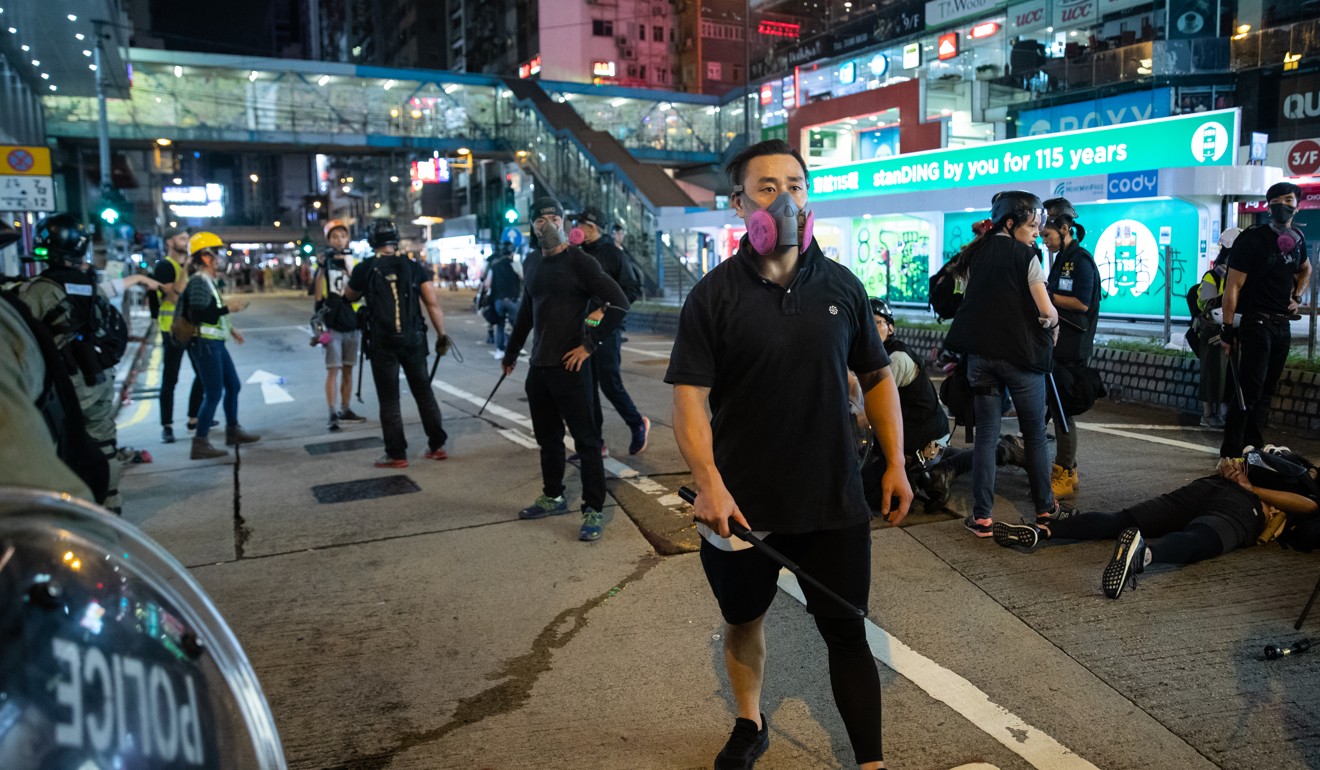
Hong Kong police deny planting evidence and say protesters dropped sticks during course of arrest
- Video footage of the incident circulated on social media sparking an outcry among protesters
- The escalation in violence on Sunday has led to one former member of the police watchdog to suggest officers should be investigated
Hong Kong police have denied planting evidence during the arrests of anti-government protesters during violent clashes at the weekend.
Video footage of the incident, which circulated on social media, appeared to show officers putting sticks in a protester’s rucksack in Causeway Bay on Sunday.
But on Tuesday, police said the suspects had dropped the sticks and during the chaos officers just put them back after they had fallen on the ground.
“The protesters were holding the sticks at the time, which fell to the ground after we arrested them, so the officers put them in their backpack,” Senior Superintendent Li Kwai-wah said.
“As a crime investigator, I would say the handling is not perfect but acceptable, with room for improvement.”

Police have also been under fire after a woman suffered a serious eye injury, reportedly after being hit by a beanbag round.
In his meeting with the press, Li encouraged the woman to come forward to give a statement, but refused to guarantee that she would not be arrested for taking part in the protests.
The force’s response came after a former member of the Independent Police Complaints Council, and a legal scholar, said officers may have broken the law, and should be investigated for criminal offences during the anti-government protests over the weekend.
As Hong Kong police and protesters up the ante, is more violence inevitable?
In turn, the pair were reacting to yet another wave of intense clashes on Sunday between protesters and police, who were seen firing tear gas and shooting protesters with a pepper ball launcher at close range inside MTR stations.
Police said a petrol bomb hurled by protesters had hit an officer giving him second-degree burns.
Former University of Hong Kong law dean Johannes Chan Man-mun said some of the police actions amounted to “a clear case of an abuse of power”.
“This is a suspected criminal offence which the government has to investigate,” Chan said.
Eric Cheung Tat-ming, a former member of the Independent Police Complaints Council, also raised concerns in a radio interview.
Carrie Lam fights tears to warn protesters against pushing Hong Kong ‘into abyss’
“From much of the television footage I have seen recently, it seemed that there was an extensive situation in which police officers did not carry out their duties according to the law,” said Cheung, a principal lecturer in law at HKU.
But Chief Executive Carrie Lam Cheng Yuet-ngor said police had been the subject of hate speech and malicious attacks that targeted not only them but also their families. She called the 30,000 officers a vital pillar of the city’s rule of law.
In another twist, police also revealed undercover officers posed as protesters on Sunday to make arrests.
Cheung said that before an arrest, an officer should believe the person had broken law, and should clearly explain to a suspect why they were being arrested.
“But I didn’t see those officers doing so. They just went up and arrested people, and sometimes hitting them with a baton first,” he said.
Cheung accused officers of indiscriminately using force.
“When police were using force, different footage showed that the officers couldn’t tell whether their targets were those who had broken the law,” he said. “Using force indiscriminately is a very big problem.”
In the long term, only a political solution, or an ugly and costly crackdown, will bring an end to this current predicament
He accused senior officers of allowing those on the front line to extensively contravene the Police General Orders.
An example he used was officers in uniform not displaying their identification numbers or warrant cards. Police have said they do not believe that to be a problem.
Cheung said it would be difficult for the complaints monitoring body to follow up as “hundreds of officers did not show their identification and were in helmets”.
“As there is no way to identify them, there would not be effective constraints by law and complaints,” he said. “In other words, officers carrying out their duties are not bound by the law, and would not face consequences.”
He believed that could lead to “irrecoverable damage” to the rule of law. When meeting the press on Monday, police said officers would begin to produce their warrant cards as soon as a given situation allowed.
Security expert Steve Vickers, founder of risk consultancy Steve Vickers and Associates, said the use of flash crowds and violence could increase as students, who made up a large segment of the protesters, return to school in September.
He also anticipated that Beijing would not allow the unrest to persist until October 1, the 70th anniversary of the national day, calling the date “a drop-dead deadline”.
He said although the risk of direct intervention by Beijing had heightened, it remained “an unlikely outcome in the shorter term”.
“In the long term, only a political solution, or an ugly and costly crackdown, will bring an end to this current predicament,” he said.


